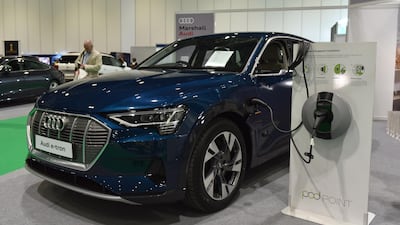Volkswagen’s Audi luxury-car brand is in talks to add China’s BYD as a supplier of batteries used in its premium electric vehicles, according to people familiar with the matter.
Negotiations with Warren Buffett-backed BYD, China’s top electric-car manufacturer and number two auto-battery supplier, are at an advanced stage, the people said, asking not to be identified because the talks are private.
BYD is also in discussions with other automakers about battery-supply deals, one of the people said. There’s no guarantee that an agreement with Audi will be reached, the people said.
Carmakers are seeking to diversify supplies of critical components as the roll-out of electric models gains traction. VW plans to deliver 22 million fully electric vehicles worldwide by 2028, with more than half of them built in China, where BYD makes batteries. Audi currently uses battery cells from Contemporary Amperex Technology for its Q2L e-tron sport utility vehicle sold in China.
In May, concerns over a battery supply deal with Samsung SDI unravelling in Europe pushed VW to rework details after pledged supplies shrank to less than 5 gigawatt hours from just over 20GWH. For BYD, teaming up with a global luxury brand like Audi will help it take on bigger rival CATL. The two Chinese companies are emerging as challengers to Tesla suppliers Panasonic. and LG Chem.
BYD’s batteries would be used to equip upscale cars made on the Premium Platform Electric architecture jointly developed by Audi and Porsche, said one of the people. The first models are slated to hit the market around 2021.
An Audi spokeswoman said the company is in talks with several manufacturers, and no decision has been made. BYD didn’t have any information to disclose at this point, according to a spokeswoman.
Audi and BYD had also explored options for deeper ties including a joint venture or acquiring a stake in the Chinese supplier’s battery unit, the people said. It’s unclear how far those talks progressed, they said.
BYD plans to list its battery business by the end of 2022 to help raise funds for expansion as the industry shifts to electric cars, Chairman Wang Chuanfu said in December.
BYD has so far been focusing on making batteries for its own car assembly only, becoming China’s top maker of so-called new energy vehicles while missing out on taking a bigger slice of growing battery demand in the world’s largest electric-vehicle market.
The value of batteries used in electric cars, electric buses and related energy storage is set to balloon about 10 times to a potential $500 billion by 2050, according to Sanford C Bernstein.
BYD also cooperates with Audi rival Daimler on making the Denza brand of electric vehicles.

